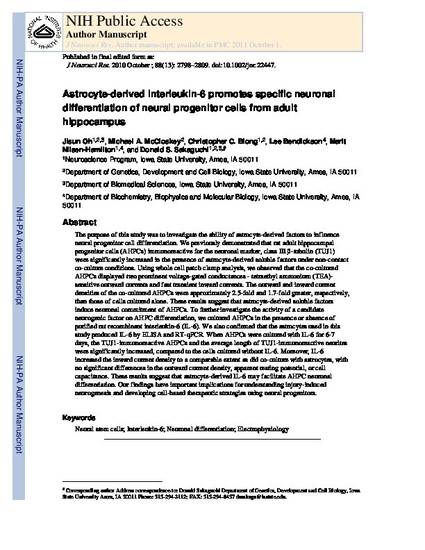
Article
Astrocyte-derived interleukin-6 promotes specific neuronal differentiation of neural progenitor cells from adult hippocampus
Journal of Neuroscience Research
Document Type
Article
Disciplines
Publication Version
Accepted Manuscript
Publication Date
10-1-2010
DOI
10.1002/jnr.22447
Abstract
The purpose of this study was to investigate the ability of astrocyte-derived factors to influence neural progenitor cell differentiation. We previously demonstrated that rat adult hippocampal progenitor cells (AHPCs) immunoreactive for the neuronal marker, class III β-tubulin (TUJ1) were significantly increased in the presence of astrocyte-derived soluble factors under non-contact co-culture conditions. Using whole cell patch clamp analysis, we observed that the co-cultured AHPCs displayed two prominent voltage-gated conductances - tetraethyl ammonium (TEA)- sensitive outward currents and fast transient inward currents. The outward and inward current densities of the co-cultured AHPCs were approximately 2.5-fold and 1.7-fold greater, respectively, than those of cells cultured alone. These results suggest that astrocyte-derived soluble factors induce neuronal commitment of AHPCs. To further investigate the activity of a candidate neurogenic factor on AHPC differentiation, we cultured AHPCs in the presence or absence of purified rat recombinant interleukin-6 (IL-6). We also confirmed that the astrocytes used in this study produced IL-6 by ELISA and RT-qPCR. When AHPCs were cultured with IL-6 for 6-7 days, the TUJ1-immunoreactive AHPCs and the average length of TUJ1-immunoreactive neurites were significantly increased, compared to the cells cultured without IL-6. Moreover, IL-6 increased the inward current density to a comparable extent as did co-culture with astrocytes, with no significant differences in the outward current density, apparent resting potential, or cell capacitance. These results suggest that astrocyte-derived IL-6 may facilitate AHPC neuronal differentiation. Our findings have important implications for understanding injury-induced neurogenesis and developing cell-based therapeutic strategies using neural progenitors.
Copyright Owner
Wiley-Liss, Inc
Copyright Date
2010
Language
en
File Format
application/pdf
Citation Information
Jisun Oh, Michael A. McCloskey, Christopher C. Blong, Lee Bendickson, et al.. "Astrocyte-derived interleukin-6 promotes specific neuronal differentiation of neural progenitor cells from adult hippocampus" Journal of Neuroscience Research Vol. 88 Iss. 13 (2010) p. 2798 - 2809 Available at: http://works.bepress.com/marit-nilsen-hamilton/28/

This is the peer reviewed version of the following article: Oh, J., McCloskey, M. A., Blong, C. C., Bendickson, L., Nilsen-Hamilton, M. and Sakaguchi, D. S. (2010), Astrocyte-derived interleukin-6 promotes specific neuronal differentiation of neural progenitor cells from adult hippocampus. J. Neurosci. Res., 88: 2798–2809, which has been published in final form at doi:10.1002/jnr.22447. This article may be used for non-commercial purposes in accordance With Wiley Terms and Conditions for self-archiving.